By: FlowerSunRain
If you are like me, you like casting Giant Growth. Unfortunately in most cubes, there are a lot of reasons not to cast Giant Growth. Value creatures say, “Why not just play more dudes with etb abilities?” Efficient removal says, “Who needs to be tricky when you can just kill their guy?” Instant speed removal says, “Get 2-for-1’d, n00blord.” Slotting in Giant Growth can be a depressing proposition.
Well, good news. Theros has introduced a mechanic that rewards you for casting Giant Growth (and many other spells) on your creatures: Heroic. Heroic creatures love to be targeted by friendly effects and pay dividends when you do. But, is this good enough? Should you include the heroic creatures in your cube? What cards that trigger heroic are worth playing? What design considerations need to be examined to ensure casting Giant Growth can be a rewarding experience? This guide might be able to give some ideas.
The Heroic Creatures
Like any type of card, not every creature with the word heroic on it is created equal. First, let’s examine what we’re working with.
White
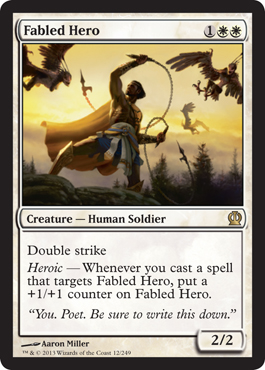
Fabled Hero: Let’s start with a bang. Fabled Hero is an amazing creature and has amazing synergy with everything you want to do. His heroic ability is not unlike that of most white creatures: he gets a +1/+1 counter, but double strike makes this extra enticing. Beyond this, many of the cards you will use to trigger heroic will be more valuable on your Fabled Hero. This card has little subtlety in his role: he kills your opponent very quickly. Connecting with a Giant Growth on him will take a cool 12 life from your opponent. Putting an Armadillo Cloak on him and swinging even once can make racing absolutely impossible. I don’t know why I’m even typing this, it’s all pretty obvious. This guy is decent without heroic, with heroic and in a cube designed around Giant Growth, he’s a centerpiece.
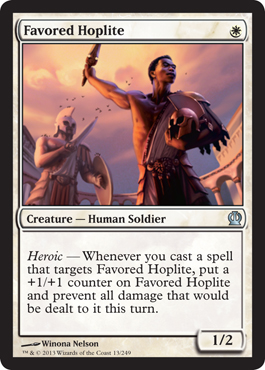
Favored Hoplite: This is a solid one drop, if you trigger him. He builds value, dodges burn and puts down pressure. Unfortunately, a lot of the cards that trigger heroic are reactive in nature. Until you make him heroic, Favored Hoplite isn’t doing much of anything. If the heroic trigger you drew is Rancor or Unstable Mutation, you really don’t care, just cast it and start swinging. If the heroic trigger you drew is Shelter or Vines of Vastwood, your opponent probably isn’t going to block or target the Favored Hoplite to allow you to cast these favorably. This certainly isn’t the best one drop ever printed, but decent one drops are scarce enough and it is useful and in theme, so it’s a win.
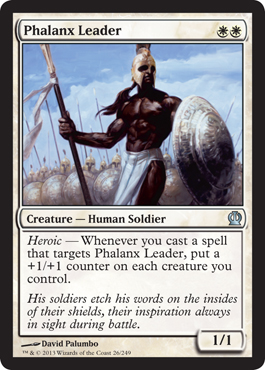
Phalanx Leader: This guy is a heroic anthem. The bad news is that he starts well below the curve and that even triggering his heroic doesn’t get him onto the curve. You absolutely need to trigger him with people on the board. Unfortunately, he dies to every removal spell ever printed outside of Sunlance, Reprisal and Seize the Soul which aren’t even in the removal suites of most cubes. You would need to run an obscenely low curve with lots of token makers and little removal to make this guy pay dividends with frequency.
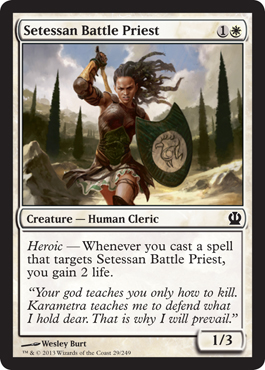
Setessan Battle Priest: I love Seacoast Drake with a passion few will ever understand. That said, this card doublestuffs aggro without remorse. The decks that want this card probably don’t want heroic enablers. This is pretty much a lose-lose. I wouldn’t go near this.
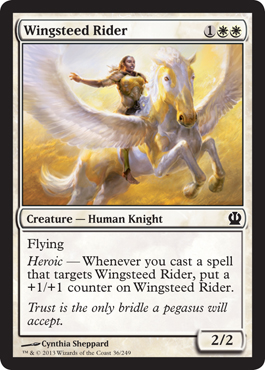
Wingsteed Rider: It’s a got evasion and gets on curve with one activation. Not interesting, but can certainly play a budget filler role if you want to go deep on heroic.
Blue
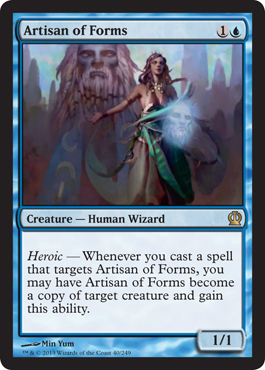
Artisan of Forms: An adjustable clone for two mana is pretty great. Getting value out of this card will take a little work, but the playmaking potential here is high. The problem is the card is basically useless until you trigger the heroic, but being able to invest your turn two to preemptively trump an opponent’s fatty is mean. It can’t copy ETB abilities, though. This is a reasonable addition.
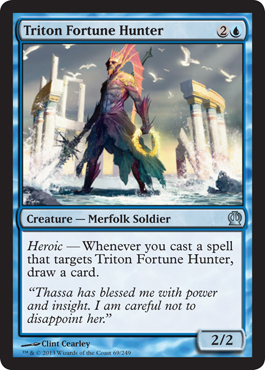
Triton Fortune Hunter: If you can stomach playing a Gray Ogre, you can ensure that you don’t get doubled up on your enchantments and pumps. With enough tempo disruption, this could be a winning proposition, but have to cast your spells on a Gray Ogre. This is an option if you want to go deep.
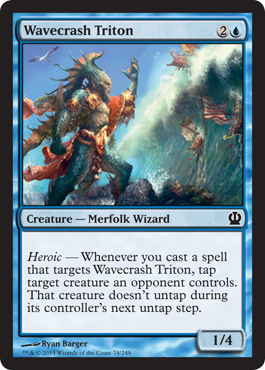
Wavecrash Triton: Another mediocre choice. There are plenty of cards that do a similar effect and more aggressive bodies that don’t require a heroic trigger. I wouldn’t go near this, even if it is hilarious with Hidden Strings.
Black
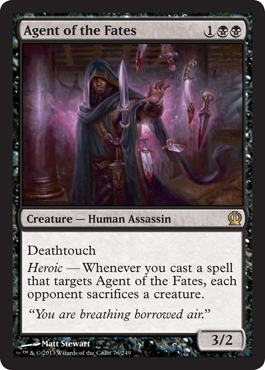
Agent of the Fates: This is an absolute beating of a card. The base body is certainly not amazing, but it gets work done. The heroic trigger, however, is stellar. Diabolic Edict is already a good card, now you can have other cards do double duty as diabolic edicts while putting pressure on the opponent’s life total. This is a hands down amazing card that is worth playing if you pay any attention to heroic triggers.
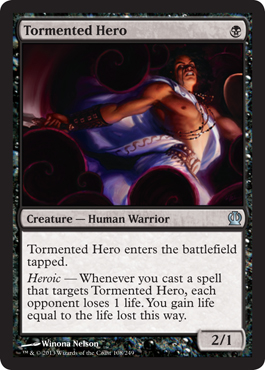
Tormented Hero: This is a generic beatdown tool. His heroic grants you a little reach and a little life that black decks love converting into advantages. People stuffing aggro creatures will run this without heroic, even if he is below the curve. You should definitely run it because your heroic minded cube might get more value out of this, though he is a nonbo with Grave Servitude and Funeral Charm which are two of black’s most reliable heroic triggers.
Red
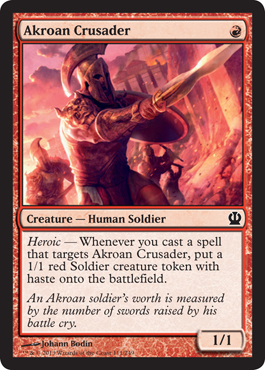
Akroan Crusader: We love one drops. Like Favored Hoplite, this card is well below the curve if you don’t trigger heroic. One trigger makes him equal to a Dragon Fodder, but there will be many times you don’t want to use a card on his awful base stats just to get another card with awful base stats. There is certainly some silliness that can arise of this guy, but most of it is far-fetched. This card is good by virtue of its spot on the mana curve, but certainly expendable.
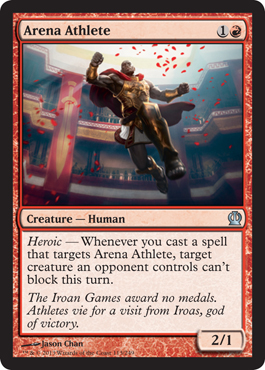
Arena Athlete: There are cards that do similar things without heroic. This is really bad.
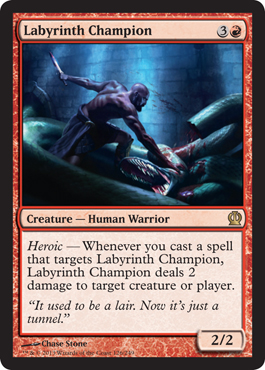
Labyrinth Champion: Absolutely terrible base stats. Don’t go near.
Green
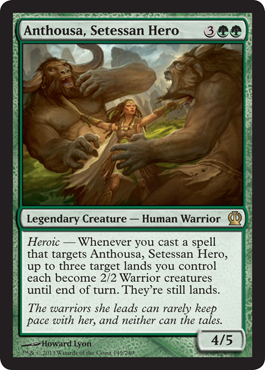
Anthousa, Setessan Hero: This is a tough one. She clearly has huge impact if you trigger her, but in terms of raw power, she doesn’t hold up in a post-Kalonian Hydra world unless you have an anthem on the table. I personally think Kalonian Hydra is one of the worst cards ever printed and that Anthousa is a much better example of what I want out of a raw power five drop (see also Archangel of Thune vs. Baneslayer Angel). Anthousa is a game ending powerhouse that can easily find a home if you don’t like the Hydra or need two cards with that sort of function for some reason.
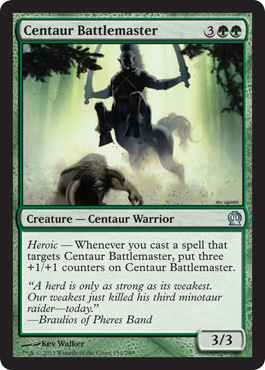
Centaur Battlemaster: Unfortunately this has terrible base stats and an uninteresting heroic ability. You’d have to go extremely deep to play this.
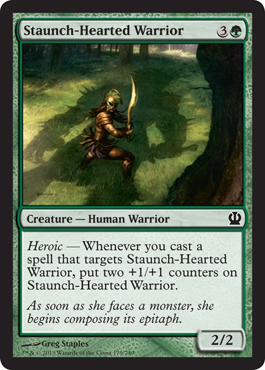
Staunch-Hearted Warrior: You can repeat the above comments here.
Multicolor
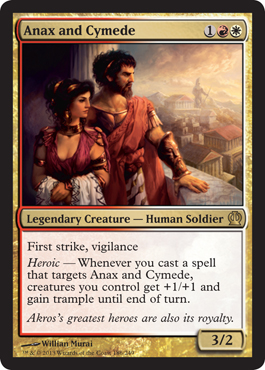
Anax and Cymede: Unlike many of the other cards we’ve seen, Anax and Cymede start with good combat stats. Their heroic trigger pumps up your whole team and adds an ability that is potentially relevant even without a single other creature on the board. While it lacks Fabled Hero’s potential to solowin you the game, Anex and Cymede gives you a tool for applying lots of pressure and reach over chump blockers. This pair is exactly what you want in a heroic creature.
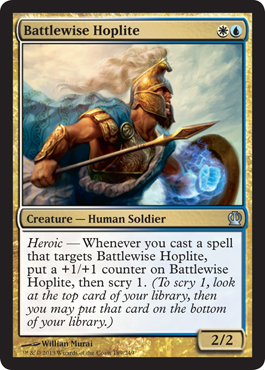
Battlewise Hoplite: Let’s face the sad truth: a 2/2 for 2 colored mana is below the curve. After one activation, Battlewise Hoplite is on curve and has scryed one card, which may or may not have helped you and can do it again later. This card is absolutely nothing special and is only good for going deep on the theme.
Heroic Enablers
Now that we have a few heroes, we need cards to trigger them. There are obviously a lot of cards in Magic’s history that can do this, so this is not comprehensive.
White Notable Cards
Emerge Unscathed: This triggers heroic twice, which is a significant advantage. At one mana, this card counters removal, gets creatures unblocked and messes up combats. Like its unappreciated sibling Shelter (and to some extent Cho-Manno’s Blessing), most people don’t cube this, but it consistently makes an impact.
Angelic Destiny: It’s not rancor, but rancor is just nuts. Making the creature more survivable helps make up for the casting cost difference. This card is very underrated.
Shelter, Harm’s Way, Embolden, Hopeful Eidolon, Gift of Immortality, Guided Strike, Griffin Guide, Hyena Umbra, Empyrial Armor
Blue Notable Cards
Hidden Strings: Due to the way Cipher works, this card can trigger heroic every single time cipher is triggered. The tap ability also helps get your creature in the first time.
Curiosity, Spectral Flight, Unstable Mutation, Piracy Charm, Distortion Strike, Fate Foretold, False Demise
Black Notable cards
Funeral Charm, Grim Servitude, Undying Evil, Profane Command, Nighthowler, Boon of Erebos
Red Notable Cards
Reckless Charge, Brute Force, Dragon Mantle, Seething Anger, Blood Lust, Madcap Skills, Mark of Fury, Arcane Teachings
Green Cards
Prey Upon, Giant Growth, Keen Sense, Vines of Vastwood, Rancor, Boar Umbra, Spider Umbra, Snake Umbra, Sylvan Might, Elvish Fury, Prey’s Vengeance, Boon Satyr, Increasing Savagery, Stonewood Invocation, Might of Oaks, Resize
Multicolor/Hybrid
Simic Charm, Boros Charm, Pit Fight, Double Cleave, Gift of Orzhova, Armadillo Cloak, Squee’s Embrace, Shielding Plax, Armed // Dangerous
Any Color
Other Considerations
Obviously there aren’t very many strong heroic cards. Only seven would I qualify as good and only a few more are playable if you want to go deep. However, we must remember that our goal is not to push heroic as a cube concept. Rather, we are using heroic to help push cards like Giant Growth and the gameplay including such cards entails. Doing so requires not just trying to slot in some enablers and calling it a day, but also ensuring your environment supports this type of gameplay. Here are some areas to focus on.
Redundancy in Value Slots: If you have so many high value creatures that everyone has access to as many as they can feasibly jam into their decks, auras and combat tricks look a lot less attractive. Reducing the redundancy in these slots makes combat tricks look more attractive. Furthermore, reducing the number of high value three to five drops and replacing them with low cost auras and instants has the extremely desirable side effect of dropping down your mana curve. This redundancy is problematic in its own right already and fuel for the fire that is “midrange beats aggro”. Basically, make sure there aren’t enough mid-cost, all upside value cards to go around so that people actually have to fight for them, then fill out their decks with more situational picks. Another nice upside of this approach is that aggro decks will actually have a fighting chance against control decks without having to rely on cards that remove the opponent’s ability to play the game.
In summary, aggressively lower your curve by taking out redundant value cards!
Your Removal: Apparently Searing Spear is a good, playable, cubeworthy piece of removal. And yet, people still run Lightning Bolt. Efficient instant speed removal makes a lot of these cards losing propositions, particularly when the removal lacks restrictions. While undesirable, getting in one hit with a Gift of Orzhovaed Markov Blademaster might cause an acceptable life swing that can help recover from the card loss. When it gets bolted mid-flight it is totally backbreaking in terms of tempo and card advantage, plus it requires basically zero risk on the part of the reacting player. Replacing some of this extremely good removal with more narrow, more costly or slower options will really help. Cards like Diabolic Edict (can be played around), Tragic Slip (potentially narrow) and Hero’s Downfall (high cost) are all extremely good removal cards that still let auras and combat tricks play the game while keeping problematic creatures in check.
Avoiding the Poison Principle in Design: One thing we don’t want to end up is only one deck type wanting these cards. As such, we need overlapping value. While pure control decks won’t want most of this stuff, basically everyone else can get value from it. A couple of card types benefit a little more and create synergies for competition.
Double Strikers love a lot of these cards. Look to Silverblade Paladin, Mirran Crusader, Fencing Ace, Markov Blademaster, Ajani, Caller of the Pride, Armed // Dangerous, Hound of Griselbrand, Savageborn Hydra, Viashino Slaughtermaster, Wrecking Ogre and Kruin Outlaw. Red and White have basically all the support here.
Hexproof loves these cards too. Although some hate it, hexproof without a doubt is a huge boon to auras and combat tricks. Look to Slippery Bogle, Troll Ascetic, Thrun, the Last Troll, Geist of Saint Traft, Invisible Stalker, Witchstalker, Silhana Ledgewalker, Swiftfoot Boots, Lazav, Dimir Mastermind, Sigarda, Host of Herons and Lumberknot. Green and Blue have basically all the support here.
Black? Black probably has the best heroic card (at least tied with Fabled Hero), but it has very few enablers or other cards that work well with auras and combat tricks. It also has many of the better cards for blowing out these situations, putting them in role of the spoiler.
Discuss this article in our forums.
